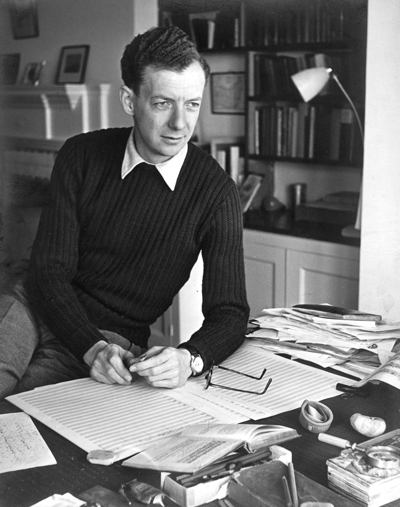by Jarrett Hoffman

•Intersections of politics and music: climate protests at the Met Opera, Russian conductor and Putin supporter Valery Gergiev to lead Bolshoi Theater, and two pieces of news related to Spotify — its controversial new payment policies, and its response to a bill in Uruguay requiring “fair and equitable remuneration”
•Almanac: Benjamin Britten (pictured), Frank Zappa, and National Cookie Day
INTERESTING READS:
A production of Wagner’s Tannhäuser at the Metropolitan Opera was notable first because of the company debut of baritone Christian Gerhaher — then because of climate protests that broke out from members of the audience. Writing for The New York Times, Joshua Barone reviews the November 30 performance, including the protests themselves, the “angrily bothered, even violent response from others,” and the struggle to fully engage with the show for the remainder of the evening. Read “Climate Protests Upstage a Debut at the Met Opera” here.
Russian conductor and prominent Putin supporter Valery Gergiev has been appointed to lead the Bolshoi Theater in Moscow, replacing Vladimir Urin, who last year signed a petition opposing the war in Ukraine. Read the New York Times article by Javier C. Hernández and Ivan Nechepurenko here.
And in another intersection of politics and music, The Guardian reports that Spotify will “phase out service in Uruguay after the passing of a new music copyright bill requiring ‘fair and equitable remuneration’ for authors, composers, performers, directors and screenwriters.” This follows the news that Spotify has updated its payment policies: according to an article from Ludwig Van, “Starting in 2024, tracks with fewer than 1,000 streams will no longer be eligible for royalties…Many emerging and independent artists in niche or experimental genres typically won’t reach the 1,000-stream threshold, shutting them out of streaming revenues.”
TODAY’S ALMANAC:
by Daniel Hathaway
On this date in 1976, England and the classical music world lost one of its greatest composers when Benjamin Britten died in Aldeburgh, Sussex, at the home he shared with his partner, tenor Peter Pears, and in the village where he and Pears had established the Aldeburgh Music Festival in 1948.
Britten’s operas are at the center of his compositional output, but he wrote in nearly every genre. He sat for an interview with the CBC in 1968 where he talked about his career as a composer.
Considering the season, who can mention Britten without thinking of his wonderful A Ceremony of Carols for treble choir and harp, written at sea between the U.S. and England in 1942? The eleven Middle English poems Britten selected inspired him to write some unforgettable music. Listen here to a performance by the choir of Christ Church Cathedral, Oxford, and here to a 2017 Brownbag Concert performance by the soprano and altos of the choir of Trinity Cathedral, Cleveland.
Another inspired setting of Medieval poetry is his 1930 A Hymn to the Virgin for chorus and semi-chorus, sung here by Quire Cleveland.
Recent Cleveland performances of Britten’s chamber music include his String Quartet No. 2, performed at ChamberFest Cleveland in 2013, and his Phantasy Quartet for oboe and strings, recorded on the Severance Hall stage in the summer of 2020 by physically-distanced Cleveland Orchestra musicians.
Britten’s renown as a composer is reflected in Arvo Pärt’s Cantus in Memoriam Benjamin Britten. Listen here to a performance by the Baltic Sea Youth Philharmonic.
And on this date in 1993, iconoclastic American composer and guitarist Frank Zappa died of cancer at the age of 52 in Los Angeles. His wide-ranging career is too complex to sum up in a few sentences, but Zappa equally impressed amphitheaters-full of rock fans and symphony orchestra conductors like Zubin Mehta, Kent Nagano, and Pierre Boulez with his compositional prowess and guitar playing.
Listen to a performance of Zappa’s Perfect Stranger by the Ensemble Intercontemporain, led by Matthias Pintscher, and to a France Culture retrospective, Zappa et la musique du XXe siècle.
And this is National Cookie Day in the United States, invented in 1976 by Sesame Street (and you know who) but “officially” moved to December 4 by proclamation of the San Francisco Blue Chip Cookie Company’s Matt Nader.
How to celebrate the ubiquitous cookie? (The name has been adopted into American English from the Dutch term koekie, but spurned by the Brits, who call them biscuits). Bake them, buy them, give them, eat them. Bakers might like to try Dorie Greenspan’s recipe for “World Peace Cookies.” If anything works, these might.



